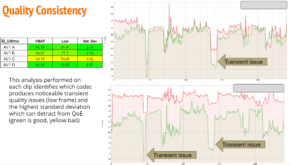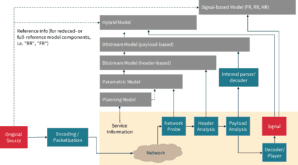Just a quick note to celebrate the first review of my Encoding with the AV1 Codec course ($99.95). By way of background, I designed the course to help familiarize students with the confusing array of AV1 encoding parameters and to offer sample command strings that I have proven over weeks of testing. In other words, to save time, which is …
Read More »Streaming Media Bootcamps at Streaming Media University
I’m teaching two boot camps (virtually) at an upcoming Streaming Media University event, one for VOD and the other for live streaming; each costs $199. The courses are designed for newbies who need to get up to speed quickly on these topics. If the courses sound familiar, I did teach the same courses at the Streaming Media West event in …
Read More »Encoding H.264-Advanced Topics
Recently I received a shortlist of compression-related questions from a consulting buddy; he’s always been gracious in answering my questions and I wanted to return the favor. Since he’s asking, I thought others might be curious as well; hence this blog post that largely incorporates my responses to his questions, all relating to encoding H.264 files. Here are the questions: …
Read More »Catching Up with VVC
VVC is one of the three codecs to be launched by MPEG in 2020. I wrote about VVC extensively here (business side) and here (technical side), and wanted to provide some quick updates. By way of background, codecs have two sides, the performance side, and the business side. In this short article, I’ll address both. Fraunhofer’s VVenC Sets New Standards …
Read More »How to Create a New Video Encoding Command String in 11 Simple Steps
I’ve spent the last two months testing four AV1 codecs accessible via command-line arguments and I start testing VVC codecs next week. Trying to fairly and accurately test the capabilities of these codecs turned out to be a pretty grueling and messy task. The key challenge, of course, was creating the optimal video encoding command string for each codec. While …
Read More »Streaming Media Bootcamps at Streaming Media West
I’m teaching two boot camps (virtually) at Streaming Media West, one for VOD and the other for live streaming; each costs $199. The courses are designed for newbies who need to get up to speed quickly on these topics. Here’s the information for both. W1. Streaming Media Bootcamp, Part 1: Encoding, Packaging, And Delivery For VOD Monday, October 5: 8:00 …
Read More »Video Quality Metrics: One Number Doesn’t Cut It
Webinar: Choose and Use the Best AV1 Codec
Jan Ozer here. I spent the last 2 months working with four AV1 codecs, benchmarking them against each other and x264 and x265. I’m presenting my findings in this for-fee 75-minute webinar ($149.99). There are two parts; the first shares what I learned about the codecs, and the second details what I learned about encoding with them and creating the …
Read More »Lesson of the Week: Set I-frame Interval in Seconds not Frames
This lesson is derived from my book, Learn to Produce Videos with FFmpeg In 30 Minutes or Less ($34.95), and my course, FFmpeg for Adaptive Bitrate Production ($29.95) (which includes a PDF copy of the book). Don’t just learn FFmpeg; become an expert in video compression. Overview: Setting your I-frame interval in seconds rather than frames allows you to use …
Read More »Introducing ITU-T Metrics P.1203 and P.1204
While standards-based video codecs like H.264 and HEVC tend to dominate, standards-based video quality metrics have never risen to the same usage or attention level. With two innovative and highly accurate metrics now available from the ITU-T, this may change in the near term. Briefly, these models are: ITU-T Rec. P.1203, which calculates the quality of HTTP Adaptive Streaming (HAS) …
Read More » Streaming Learning Center Where Streaming Professionals Learn to Excel
Streaming Learning Center Where Streaming Professionals Learn to Excel












